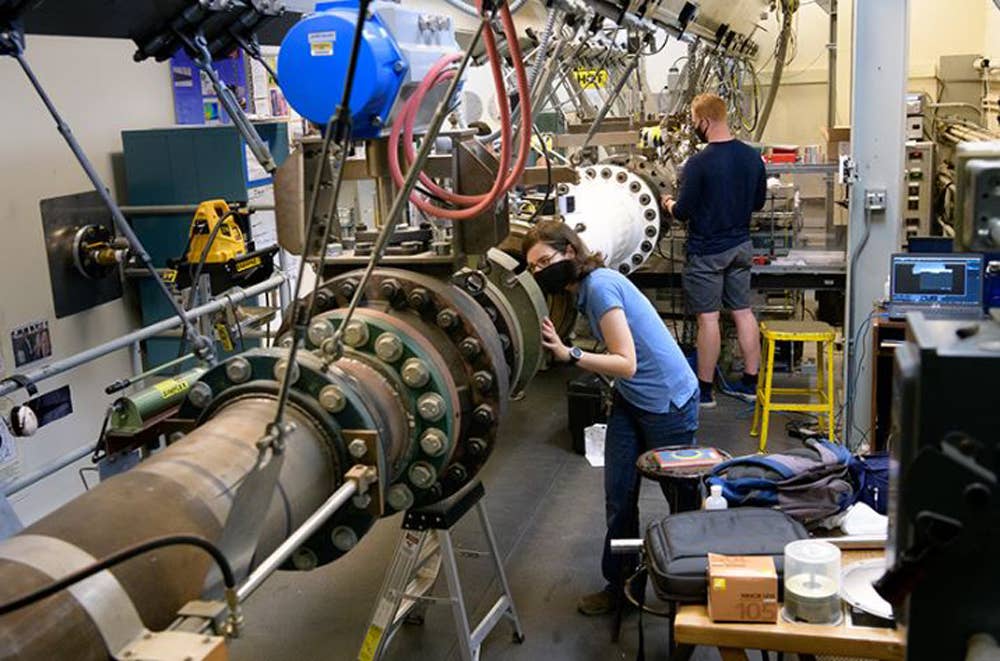
Students work with Purdue’s Mach 6 quiet wind tunnel. Courtesy Purdue University
Purdue University has been involved in aviation education since the mid-1930s. Recent announcements suggest that this program with such a long history is about to make some more historic strides.
With steps under way for a hypersonic test facility and a soon-to-be-installed hypersonic tunnel, Purdue has raised interest from an already deep-pocketed partner—Rolls-Royce—that plans to build a new test facility on the Purdue grounds.
What could all this mean?
Research for National Security
In late July, Purdue announced plans to construct a 65,000-square-foot hypersonic research facility, which will be the first of its kind. Coming in at about $41 million, this test facility will explore new hypersonic flight capabilities.
The main attraction will be the hypersonic wind tunnels. The Hypulse shock tunnel, which can reach up to Mach 40, will be able to recreate different atmospheres and give researchers the opportunity to explore many scenarios, including spacecraft reentry.
The new facility will put Purdue on the radar when it comes to many national defense projects. Hypersonic aircraft can travel through upper atmospheres at roughly five times the speed of sound, making them almost impossible to detect and engage.
Hypersonic research is something the current presidential administration finds crucial to national security, as is evident by the Pentagon’s $3.8 billion budget for it in 2022, an increase from $3.2 billion in 2021.
Theresa Mayer, Purdue’s vice president for research and partnerships, said in a release that her school is well poised to contribute.
“Purdue’s rich hypersonics program includes both a broad bench of more than 40 experts and unique capabilities that allow the university to play an important role in the security of our nation,” she said.
“Researchers will be applying the techniques at the same conditions that would occur on real systems in flight and enable measurements that have never been made before under these extreme testing conditions.”
Mayer and other researchers are counting on the facility to bring an understanding of how to design aircraft to be more efficient in the air. Hopefully, that understanding can result in reusable hypersonic crafts. If so, the work could add to the sustainability of aerospace research.
“This first-of-its-kind facility will further Purdue’s capacity to conduct research including tests and evaluations under real-world conditions for faculty, industry partners, federal agencies and other stakeholders.” Mayer said.
Help to Expand Capabilities
Rolls-Royce has decided to expand its already large presence at the university. Purdue currently houses a 55,000-square-foot Rolls-Royce test facility, but it plans to almost double its footprint.
The main reason for the development is to make room to design high-altitude and hybrid electric engines that are to be the next power plants of military aircraft.
Executive vice president for strategic initiatives at Rolls-Royce, Mung Chiang, supports the new undertaking,
“It represents the largest single economic development success to our neighborhood with Rolls-Royce colleagues and the largest research collaboration with a private-sector partner,” Chiang said.
“It also advances the excellence at scale by Purdue in creating the epicenter of aerospace engineering R&D in the U.S.”
Hypersonic Results?
How could this impact the future of aviation and aerospace defense?
With increasing enrollment every year, Purdue is bringing in more minds to make development timely. Rolls-Royce has one of the top research and development teams in the world, so this combination could help to make the US department of defense sustainable, undetectable, and hypersonic.

Subscribe to Our Newsletter
Get the latest FLYING stories delivered directly to your inbox






